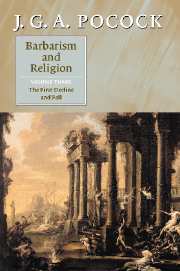Book contents
- Frontmatter
- Contents
- Acknowledgements
- Note on usages
- List of abbreviations
- Introduction
- PROLOGUE
- 1 Gibbon's first volume: the problem of the Antonine moment
- PART I THE FIRST DECLINE AND FALL: ANCIENT PERCEPTIONS
- PART II THE AMBIVALENCE AND SURVIVAL OF CHRISTIAN EMPIRE
- PART III THE HUMANIST CONSTRUCTION OF DECLINE AND FALL
- PART IV EXTENSIVE MONARCHY AND ROMAN HISTORY
- PART V REPUBLIC AND EMPIRE: THE ENLIGHTENED NARRATIVE
- PART VI GIBBON AND THE STRUCTURE OF DECLINE
- 17 The Antonine moment
- 18 The Severi and the disintegration of the principate
- 19 The Illyrian recovery and the new monarchy
- EPILOGUE
- Bibliography of works cited
- Index
17 - The Antonine moment
Published online by Cambridge University Press: 15 December 2009
- Frontmatter
- Contents
- Acknowledgements
- Note on usages
- List of abbreviations
- Introduction
- PROLOGUE
- 1 Gibbon's first volume: the problem of the Antonine moment
- PART I THE FIRST DECLINE AND FALL: ANCIENT PERCEPTIONS
- PART II THE AMBIVALENCE AND SURVIVAL OF CHRISTIAN EMPIRE
- PART III THE HUMANIST CONSTRUCTION OF DECLINE AND FALL
- PART IV EXTENSIVE MONARCHY AND ROMAN HISTORY
- PART V REPUBLIC AND EMPIRE: THE ENLIGHTENED NARRATIVE
- PART VI GIBBON AND THE STRUCTURE OF DECLINE
- 17 The Antonine moment
- 18 The Severi and the disintegration of the principate
- 19 The Illyrian recovery and the new monarchy
- EPILOGUE
- Bibliography of works cited
- Index
Summary
We at last approach the text of the Decline and Fall, after a sesquimillennial journey from the construction of the Tacitean narrative which is one of the explanatory foundations of Gibbon's first volume. The history of that narrative, traceable as far back before Tacitus as Polybius, is that of a possibly insoluble problem in the relations between libertas and imperium. Liberty achieves empire, but is corrupted by it, and empire cannot be retained once it has destroyed the liberty that once conquered and no longer defends it; yet this self-destructive libertas remains intensely admired, under the name of virtus, as one of the highest achievements of human nature. It is possible to see Athenian philosophy, perhaps as Latinised by Cicero, as a criticism of virtue in this warrior and combative form; but the Athenian ‘empire’ was transitory in comparison with the Roman, and never became a transformation of provinces into a shared ecumenical culture. The problem of libertas et imperium is therefore carried on in the history of Latin historiography rather than Greek philosophy, and the criticism of both virtus and history is achieved by Augustine, who presents both as the work of the libido dominandi, and the civitas dei as the alternative to history.
- Type
- Chapter
- Information
- Barbarism and Religion , pp. 419 - 447Publisher: Cambridge University PressPrint publication year: 2003

